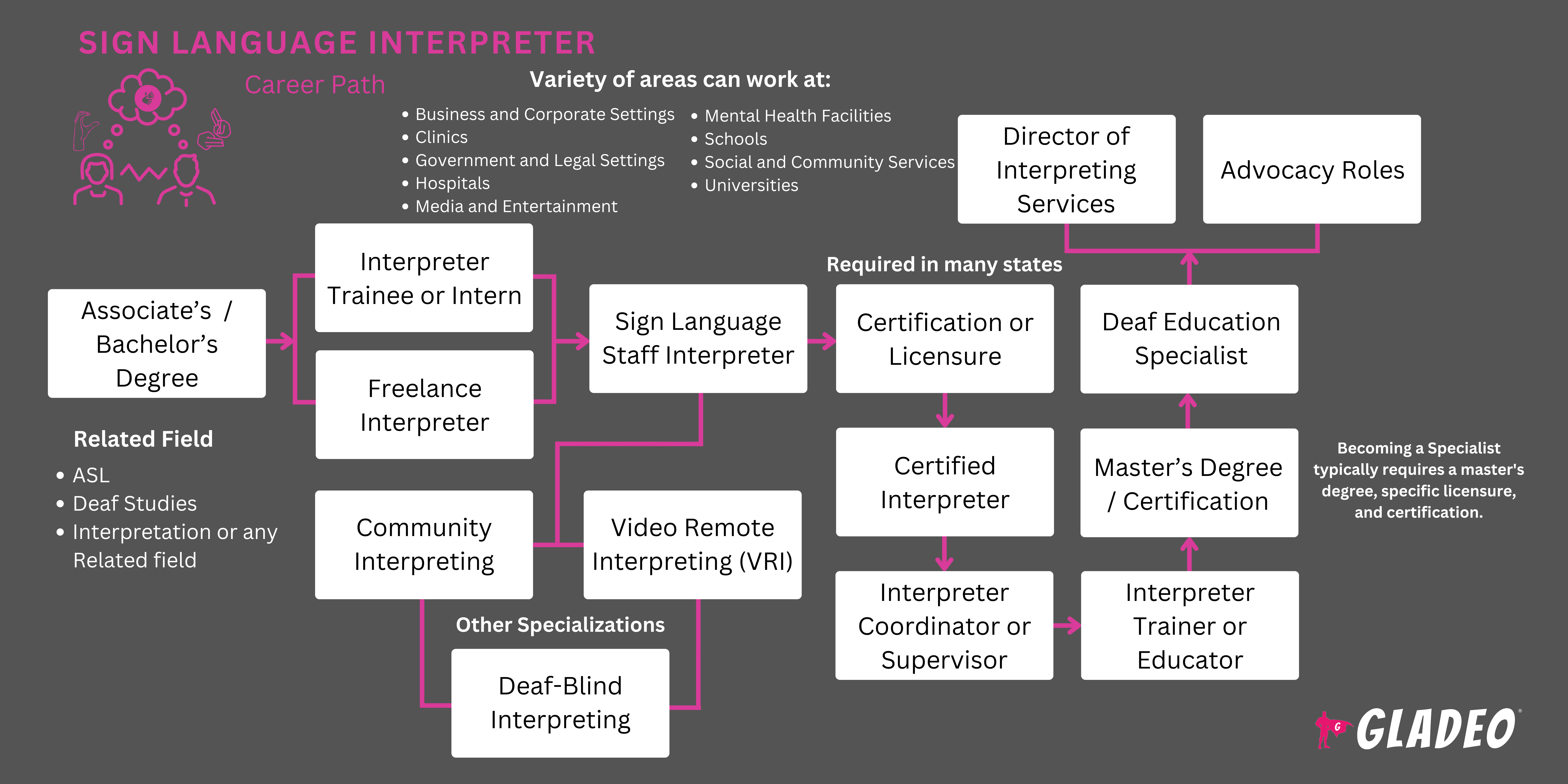聚光灯
美国手语口译员(ASL口译员),法庭口译员,教育口译员,口译员,语言学家,医学口译员,手语口译员,西班牙语口译员,西班牙语翻译员,翻译员
Sign Language Interpreters translate spoken language into sign language and vice versa, enabling better communication between people who are deaf (or hard of hearing) and those who are not. Their valuable skills are often needed in a wide range of settings, including public events, educational institutions, medical facilities, legal environments, and many more.
Sign Language Interpreters must master the art of sign language as well as the cultural nuances associated with spoken and signed languages. The job goes far beyond simple translation; they must convey intent, tone, and emotional context, often in real-time and always with extreme accuracy. Their important work helps to ensure fair, equal access to news, information, services, and opportunities that many people take for granted.
- Providing essential communication support to deaf and hard-of-hearing communities
- Contributing to greater accessibility and inclusivity
- Enhancing cultural understanding and bridging communication gaps
工作日程
Sign Language Interpreters often have flexible working hours, with full-time, part-time, and freelance positions available. Their schedules may include evenings, weekends, and holidays, especially when working in settings like hospitals, courts, or events that require on-demand services.
典型职责
- Interpret spoken language into sign language and vice versa across various settings
- Ensure the intent, tone, and other aspects of the messages being interpreted are properly conveyed
- Use reference materials as needed, such as dictionaries, thesauruses, technical manuals, glossaries, etc.
- Facilitate communication in one-on-one and group interactions
- Review relevant materials, vocabulary, and potential topics in advance, when possible, to prepare for upcoming assignments or projects
- Maintain strict confidentiality and adhere to professional standards of conduct
- Engage in continuous professional development to improve proficiency and skills
额外责任
- Educate others about the needs and cultural aspects of deaf and hard-of-hearing communities
- Advocate for improved accessibility and services in public and private sectors
- Participate in outreach and awareness initiatives to promote inclusivity
- Mentor and train aspiring interpreters
- Stay informed about relevant legal and ethical guidelines
软技能
- 适应性
- 在压力下保持冷静
- 文化敏感性
- 情绪复原力
- 同理心
- 良好的记忆力
- Excellent communication
- 人际交往技巧
- 耐心
- 时间管理
技术技能
- Proficiency in American Sign Language
- Awareness and understanding of deaf culture
- Competence in interpreting consecutively and simultaneously
- Familiarity with video relay services and remote interpreting technologies
- Knowledge of legal, medical, and educational terminology
- Corporate environments
- Courts and legal settings
- Entertainment event organizers
- Hospitals and medical clinics
- 非营利组织
- Public and private events
- 学校和大学
Sign Language Interpreters have demanding jobs! There are frequently long periods of intense concentration and quick thinking as they process, translate, and interpret information live in front of others.
They also have to manage the emotional impact of interpreting sensitive or distressing information, such as in courtroom situations.
In terms of physical demands, the work can lead to fatigue or even muscle strain over time. That’s why it’s important for interpreters to take care of themselves and maintain their physical well-being.
There’s currently a shortage of highly qualified Sign Language Interpreters, which is having a negative impact in many situations. In addition, some interpreters are less inclined to work for organizations that don’t offer fair compensation, consistent scheduling, or sufficient support in general.
Meanwhile, there’s a growing need for interpreters, especially in fields such as healthcare, education, legal settings, and corporate environments. Advancements in AI and machine learning are helping to some extent, but human interpreters are still essential for nuanced communication.
Sign Language Interpreters may have been interested in other languages and cultures at an early age. They also likely enjoyed performing arts where they could use expressive gestures and body language to convey emotions.
- A degree isn’t always necessary to enter this field, but having a bachelor’s in ASL, Deaf Studies, Interpretation, or a related field might help you be more competitive in the job market
- Certification or licensure is required in many states. Common certifications include the Registry of Interpreters for the Deaf’s National Interpreter Certification (NIC) and Certified Deaf Interpreter (CDI)
- The NIC and CDI certification process starts with a knowledge exam offered by the Center for Assessment of Sign Language Interpretation (CASLI)
- As of 2024, the cost of this exam is $325 for CASLI members and $425 for non-members
- Students must register for their exams through CASLI, but CASLI uses Meazure Learning to proctor the actual tests. The knowledge test can be taken at any of Meazure’s hundreds of test sites around the country
- Test takers are encouraged to prepare for their exams by following CASLI’s exam prep guidance
- Beyond the knowledge exam, the NIC and CDI certifications have differing requirements to complete
- Other optional certifications include:
- Administrative Office of the United States Courts -
✓ Certified Interpreter
✓ Professionally Qualified Interpreter
- American Council on the Teaching of Foreign Languages -
✓ Limited Oral Proficiency Interview Certification
✓ Listening Proficiency Test
✓ Oral Proficiency Interview
✓ Reading Proficiency Test
- American Sign Language Teachers Association
✓ Certified Level Sign Language
✓ Master Level Sign Language
- American Translators Association - Certified Translator
- Certification Commission for Healthcare Interpreters -
✓ Certified Healthcare Interpreter
✓ Core Certification Healthcare Interpreter
- National Board of Certification for Medical Interpreters - Certified Medical Interpreter - Spanish
- Ongoing professional development classes are important to stay current with evolving standards and practices
- Note, that many Sign Language Interpreters are freelancers or contractors who operate their own small businesses. Thus, they may also need to learn about basic accounting, marketing and branding, contracts, and personal liability protection
- Look for programs that offer comprehensive coursework in ASL, deaf culture, and interpreting techniques.
- Check if the program features internships, practicums, or other types of partnerships.
- Review faculty bios. Learning from experienced interpreters can provide invaluable insights.
- See if the program has access to deaf community resources. Schools affiliated with active deaf communities offer richer learning environments.
- Decide on a program format (on-campus, online, or hybrid) that suits your needs.
- Weigh the cost of tuition against available financial aid and scholarship opportunities.
- Assess faculty qualifications and alumni accomplishments.
- Consider post-graduation outcomes like job placement rates.
- Start learning ASL as early as possible to build a strong foundation
- Take ASL classes and join related clubs
- Volunteer with organizations serving the deaf and hard-of-hearing community
- Pursue internships or part-time jobs in the field
- Watch a variety of videos featuring sign language interpretation in different settings
- Build a portfolio of your interpretation work
- Stay updated with trends by reading articles and watching informational videos (see our list of Recommended
Tools/Resources > Websites) - Do an informational interview with a working Sign Language Interpreter. See if you can shadow them at work
- Join online discussion groups and professional organizations like the National Association of the Deaf
- Review job posts and descriptions to see what current qualifications and specializations employers are looking for

- Review job postings on Indeed and the Registry of Interpreters for the Deaf job board
- Look for entry-level positions, internships, or even apprenticeships
- Keep in mind, many Sign Language Interpreters work as freelancers or contractors versus full-time employees. Of those, some start their own small business or Limited Liability Company (LLC) so they can procure professional liability insurance (aka errors and omissions insurance)
- Scan job posts for keywords and work those keywords into your resume, if applicable
- Relevant resume keywords might include:
- American Sign Language (ASL)
- Simultaneous Interpretation
- Deaf Culture Awareness
- Multilingual Communication
- Certified Interpreter
- Language Proficiency
- Client Confidentiality
- 人际交往技能
- Real-time Translation
- Review some Sign Language Interpreter resume templates for ideas
- Make a professional LinkedIn profile and website to showcase your work
- Consider starting a freelance business to gain experience with paying clients
- Attend professional events such as conferences and workshops
- Ask your academic program manager if they have ties with local employers or recruiters, or know of upcoming job fairs
- Check out Sign Language Interpreter interview questions to prepare yourself. Sample questions might include:
- “How do you handle situations where you encounter a sign or concept you are unfamiliar with during an interpretation session?” or “Can you describe a challenging interpretation experience and how you managed to ensure accurate communication between the parties involved?”
- Brush up on relevant terminology and industry trends
- Ask former supervisors and college professors for references or recommendation letters
- Utilize your university’s career center for resume help and mock interviews
- 面试时穿着专业
- Talk with your supervisor about advancement opportunities. Ask what you can do to benefit your employer
- Pursue some advanced certifications that might bolster your credentials
- Consider knocking out a master’s degree
- Keep building your sign language and English vocabulary
- Branch out into languages other than English, if there’s a need in your area
- Try to work in a variety of settings on increasingly complex assignments
- Take on leadership roles within professional organizations
- Keep up with new technologies, techniques, and industry standards through continuous education and practice
- Engage with professional organizations like the American Translators Association
- If you’re up for the challenge, consider launching your own small business or LLC. Some important steps to take include:
- Obtaining necessary certifications and licenses in your state
- Determining your business structure (e.g., sole proprietorship, LLC)
- Registering your business name
- Creating a business plan and developing a pricing structure
- Setting up a business bank account and accounting system
- Buying professional liability insurance
- Building a professional website and marketing your services
- Landing clients and establishing contracts or agreements
网站
- Administrative Office of the United States Courts
- Alexander Graham Bell Association for the Deaf and Hard of Hearing
- American Association of the DeafBlind
- American Council on the Teaching of Foreign Languages
- American Literary Translators Association
- American Sign Language Teachers Association
- American Translators Association
- Center for Assessment of Sign Language Interpretation
- 医疗保健口译员认证委员会
- 美国通信工人协会
- Conference of Interpreter Trainers
- International Association of Conference Interpreters
- National Alliance of Black Interpreters
- National Association of Judiciary Interpreters and Translators
- National Association of the Deaf
- National Board of Certification for Medical Interpreters
- National Council on Interpreting in Health Care
- Nationwide Interpreter Resource
- Registry of Interpreters for the Deaf
- World Association of Sign Language Interpreters
书籍
- American Sign Language Workbook: Exercises to Build Your Signing Vocabulary, by Rochelle Barlow
- Barron's American Sign Language: A Comprehensive Guide to ASL 1 and 2 with Online Video Practice, by David A. Stewart Ed.D., et. al.
- Interpretation Skills: English to American Sign Language, by Marty M. Taylor
- So You Want to Be an Interpreter?, by Janice H. Humphrey and Bob J. Alcorn
Working as a Sign Language Interpreter can be highly rewarding, and the demand for skilled interpreters is on the rise.
However, sometimes that demand is only for individual projects versus full-time employment. As a result, some interpreters either work part-time or must juggle multiple clients to maintain a steady income. If you’re curious about some alternative options, consider our list of jobs below!
- Audiologist
- Deaf Education Teacher
- Disability Rights Advocate
- Editor
- 活动协调员
- Linguist
- Motivational Speaker
- 职业治疗师
- 私人教练
- 公共关系专家
- 康复顾问
- Sign Language Instructor
- 语言病理学家
- Translator
- 作家
点击这里下载信息图
新闻联播

特色工作

在线课程和工具







